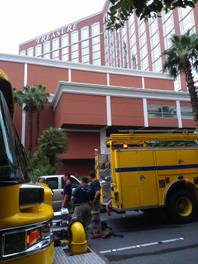“…the plaintiff’s attorney, said his clients’ case also is based on a claim that the hotel’s staff wasn’t prepared to handle a drowning emergency. Hotels aren’t required to employ lifeguards but they must designate someone  as a “certified pool operator.†In this case, the pool operator, an assistant manager, was present when plaintiff went under…but because plaintiff was unresponsive on the pool bottom by the time the pool operator pulled Brianna out of the water, and because the pool operator himself couldn’t swim, he was unable to rescue Smith before he suffered brain damage…”
as a “certified pool operator.†In this case, the pool operator, an assistant manager, was present when plaintiff went under…but because plaintiff was unresponsive on the pool bottom by the time the pool operator pulled Brianna out of the water, and because the pool operator himself couldn’t swim, he was unable to rescue Smith before he suffered brain damage…”
A Georgia man who suffered permanent brain damage while trying to save his daughter in a hotel swimming pool was the victim of negligent owners who failed to ensure the pool area was safe, a lawyer for the plaintiff said Monday during opening arguments in the civil trial.
Robert A. Smith, 40, was overcome by water on July 4, 2009, when he tried to save his 11-year-old daughter, Brianna, after she drifted into the deep end of the Ramada Inn poll in Rochelle Park. Safeguards that should have been in place – such as visual cues indicating the water’s depth and a “life line†separating the shallow and deep ends – were missing. In combination with a pool bottom that was steeper than it should have been, the result was a “perfect storm†for hotel guests who couldn’t swim, said Greg Haddad, an attorney for Smith’s family.
“This facility, its pool, were operated in a negligent manner,†Haddad told a jury in state Superior Court in Hackensack on Monday. “The focus of this company and these people was to make money at the complete disregard for [the safety of] customers.â€
The family of Robert Smith, who remains in a “minimally-conscious state†in a nursing home, is suing the owner of the Ramada Inn, Ratan R. Park, LLC., for damages, said Haddad.
In a recording of the 911 call reporting the drowning, the caller tells the emergency operator, “Somebody’s drowning inside the water. … Nobody can swim here.†Eventually, another hotel guest dove in the water to save Smith.
Smith’s condition is stable, Haddad said, and his doctors believe he could live for another 20 or 25 years. His family is asking for at least enough money to cover his medical expenses, which will amount to $7 million over his lifetime if he is cared for at home, and $12 million if he remains in a nursing home, Haddad said.
For more:Â http://www.northjersey.com/news/Lawyers_debate_Rochelle_Park_hotels_liability_in_swimming_pool_case.html










